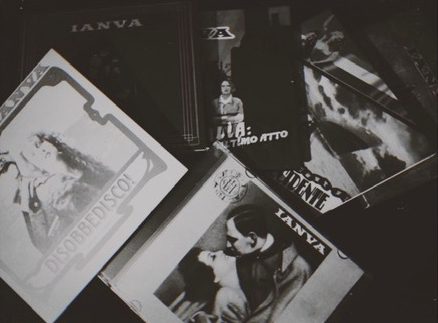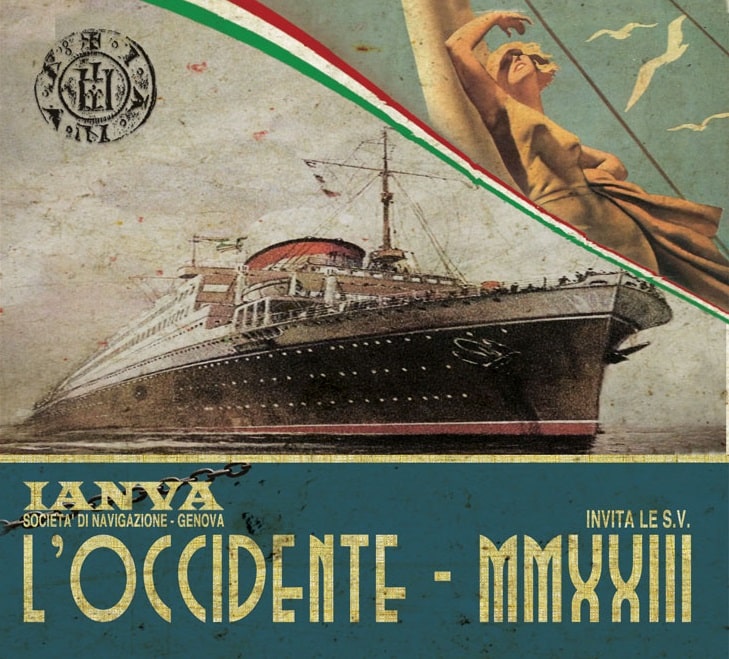
L’OCCIDENTE MMXXIII

At long last, and after a wait of more than fifteen years, “L’Occidente” is finally back in a fully revamped and complete, definitive version.
The album displays a new, extended tracklist as a sort of response from IANVA to the current historical phase we’re in, and is also an answer to the many requests received during the years.
While this edition is missing the song “In Battaglia” (which has already been included in “Memento X-C” for more consistency), three new tunes have been added that weren’t completed at the time of the original release.
Those are two cover songs – “Oceania”, by the Italian songwriter Mario Castelnuovo, and “In Germania, All’Anteguerra”, an italian remake of “In Germany Before The War” by Randy Newman, masterfully translated by Mercy – and most of all a new, previously unreleased original song, that makes all the difference: “Terminale Balcanico”, postponed for so long and that nowadays sounds so hauntingly prophetic.
So, IANVA invites all of you to come aboard: it’s time to set sail.
Heading Westward, let’s go dance over the Abyss.
Do not fear that seats may sell out.
The Abyss can easily accommodate us all.
Today, “the West” is a conveniently undefined construct that – for several vague reasons – some people repeatedly insist must be “saved” and/or “protected”.
It is a pity that those who are now “assembling” and calling men and minds up, are also guilty of having inserted in the collective unconscious something that in the past the Old Europe had never known – even in its frequent darkest nights.
This alien thing is nothing but a new vulgarity of disposition, nature and character.
The great Scott Walker and the O.S.Ts of some old Italian “B movies” provided IANVA once again with good hints as to how to put forward their point of view and speak their mind.
This is IANVA’s way to say: “Sorry, but don’t count on us…”
L’OCCIDENTE (THE WEST)
Like the Northern hordes with their barbarian deities
Who mistook the marbles of Luni* for Rome,
Or the wandering feral Altaics from the East
Who founded empires to pasture their nags,
Or the plunderers from the South who chose themselves as the only lords
And invented a god for slaves and shepherds,
We have exhausted stomachs but we are hungry like hyenas
And we’re all heading to the Big Night that’s coming…
The graveyard of sunsets is the place where the sun is going to die
But when the storm is rising, you know,
The first to dare is the first to fall…
We delegate everything, even the act of being violent
But a war of wombs is catching us completely weaponless
Always under the supervision of that “political correctness”
Which is castrating us as much as to carry on
Trapped inside this circuit with no yesterday and no today,
Licking a couple of bones as the dogs do
I have no wish to act as a Possibilist
I’m only looking at
The Big Night that is now in sight…
The horizon swallows the day where the sun is going to die.
You know, I’ve lost all my hope to see the season of Mistral back again.
The horizon meets the wave where the wind is wearing out
I’m off to the open sea and beyond, but I see no shore….
Between Vladivostok, the ultimate land
And the Orkney Islands which are the tiara of the West…
Very suggestive, I know
But what’s the use of keeping the faith
When fearing for our own skin is the only faith left?
We persist in considering ourselves the pinnacle
But the most dead of them all is much more alive
Than those who by now have just one thing that’s “sacrum”** – the bone above their ass…
And suddenly the Big Night has become a Big Wall…
A wall deaf to all crying, a wall surrounding nothing –
The West is just a direction and nothing more.
And if the sun is going to die in its arms,
And now the time has come, please
Shield that Athenian Fire you know so well
From the wind that will blow…
* Luni = http://en.wikipedia.org/wiki/Luni%2C_Italy – according to a well known legend, the barbarian tribes coming from the north to plunder and conquer Rome arrived to Luni and mistook it for the Eternal City because of its marble caves….
** this is a pun, very hard to translate in English. The italian term for the “sacrum” is “osso sacro” (“holy bone”), and “sacro” is also the Italian word for “sacred”/”holy”. The phrase is meant as “the only holy thing that it’s left for them is the holy bone above their asses”.
Some of the devotional feasts of Southern Italy show beyond doubt how much a certain popular and Mediterranean expression of Roman Catholicism has preserved and internalized many characteristics of the pagan and archaic ceremonial spirit.
In this expression we see a particular physicality. It is a visual, tactile and sensory religiousness that is peculiar to the Greek/Roman world. It is furthermore, a form that is distant both from the desert heat where all monotheisms have their origins and from the icy rigours of Protestantism.
“Santa Luce Dei Macelli” is a 3-dimensional track to sink and dive into.
Among echoes of “mafia folk” and “funeral cabaret”, the listeners are invited to lose themselves in a world that IANVA know very well. It may even be revealed that an obstinate attachment to those traditions so readily disdained and slandered by the sort of “discount Enlightenment” so en vogue today can be interpreted as an ultimate and possible chance for cultural resistance.
SANTA LUCE DEI MACELLI (ST. LUCE OF THE ABATTOIRS*)
Slower and more oppressive than a vulture’s flight
The praying crowd moves forward like oxen to the slaughterhouse.
Let the Chorus in!
Let there be the light of a thousand candles to illuminate the path!
And just to touch the borders of the Holy vestment
As if it were a balm bringing great comfort,
Knees are dragging on the ground, leaving behind them a trail
Which is foamy and dark brown, like an agony
Her white breast among the thorns is like a riddled Golgotha
And her head is crowned by the stars of Ursa Major.
With her ivory and purple face she gazes down at us
Who stand amidst the ruins,
And it’s just for our sake that her heel tramples the Dreadful Snake.
But the bloodstained leg of the Vattiente**
Is insinuating a lesson that goes unheeded:
The meekness is not always a virtue,
Those who tame their suffering don’t want the slavery.
If the holy Cardo*** is an Act Of Contrition
Just like the 7 swords deeply sinking and drinking from her heart,
I can see the serene and virile heedlessness of the archaic hoplite
Who sacrifices himself….
And from the toothless mouths of old hags black as the night
The loud, panic wave of Ionian routes will resound.
The sacred frenzies of the Attic springs are rising inside of me
And those ecstatic wars begin to belong to me.
I can still feel the warm and smoking entrails between my fingers,
And through her I can perceive the mystic flights of birds of passage.
That’s why I hold this revolver, and if you ask me the reason
I’ll answer that the time has come again for us
To stand up and honour our Gods!
* Luce is the italian word for “light” but it’s also a girl’s name. So the title is a pun and could be also translated as “Holy Light Of The Abattoirs”.
** The “Vattiente” is a penitent, the holy flagellant who lashes himself on Easter Saturday in many villages and little towns of Southern Italy. The most famous of them are the “Vattienti” of Nocera Terinese you can see in “Mondo Cane” movie. The rite of the “Vattienti” (the fiagellants) at Nocera Terinese (in the province of Lamezia Terme, hometown of IANVA’s female singer Stefania) which has survived the centuries, is both dramatic and moving. This rite takes place on Easter Saturday: groups of penitents who have received grace, their heads encircled by a crown of thorns, lash their flesh with slivers of glass applied to a waxed cork called a cardo.
*** The “Cardo” is a big cork disk with 13 nails and/or slivers of glass used by the Vattiente to lash his legs and chest.
TERMINALE BALCANICO (BALKANIAN ULTIMATE POINT OF NO RETURN)
In the vowel harmonies
Of Hungarian dialects
Mongolian reminiscences
Leading beyond the Urals.
Hired as an army
Free Saxon colonists descended on Transylvania
To combat the Imperial Crescent.
You discover a millennial echo
Of the Roman legionary march
Srtaight to the heart of Dacia
In the Latin language mixing
With the Illyrian grey wolves,
With the Sarmatians and the Phrygians,
With the Scythians of the Black Sea,
In this last outpost of the Empire.
The Balkanian ultimate point of no return –
The East is the breath of a wild beast,
It’s our ancestral cilice
With thorns made of steppe and forest.
It’s the Balkanian ultimate point of no return –
A bonduary between inside and outside,
A “satanic crossroad of well-known horrors”.
Bulgarian archduchesses
Virtuosos of whip and saber
Riding bareback and running
Barefoot in the snow.
Archangel Captain’s good wife Elena
Would offer us tea and almonds
With some sour cherries compote.
And hidden in granaries,
Buried in attics
The stock of family weapons,
Multigenerational supplies
That experience has strashed
In view of that open front
Near the eastern embankment –
An ever bleeding Side
The Balkanian ultimate point of no return
Has always fresh corpses –
A Pan-Turanic nightmare
Building towers of skulls.
On the Balkanian ultimate point of no return
You can whirl on just one leg
To the sound of a shamanic drumbeat
Among the Candlemass bonfires.
And syringae of shepherds are blowing
A Panic mood
You can fly to the sound of an odd tempo
That makes all hearts burst.